Pentateuch History and Origins Collection, 10 vols. (Library of Hebrew Bible/Old Testament Studies | LHBOTS)
Digital Logos Edition
Overview
The Pentateuch introduces us to the central themes of both Christian and Jewish theology. The first five books of the Old Testament tell the story of creation, the fall, the patriarchs, the exodus, the deliverance of the Law, and the journey to the Promised Land. We meet Adam and Eve, Abraham, Isaac, Jacob and Joseph, Moses and Pharaoh. Yet the text of the Pentateuch has been a subject of intense scholarly debate for more than a century: Who wrote the Pentateuch? How was it transmitted? How did it acquire such a prominent place in Jewish and Christian history?
The 10-volume Pentateuch History and Origins Collection contains the most important recent literature on the Pentateuch. David J. A. Cline’s Theme of the Pentateuch has become a standard introductory text to the origin and function of the Pentateuch. R. Norman Whybray’s Making of the Pentateuch and Rolf Rendtorff’s Problem of the Process of Transmission in the Pentateuch are two of the defining works on Pentateuch origins to appear in a generation, raising new questions about the Documentary Hypothesis. Additional books in this series examine the narratives in Genesis, the life of Moses, and role of Egypt in the text, and numerous other issues. The authors provide detailed analysis of prominent figures in the Pentateuch, examine the texts, and re-evaluate commonly held understandings about the origin and transmission of the Pentateuch. Together, these books represent the most important scholarly achievements in the field in recent decades.
The powerful tools in Logos Bible Software make these important books on the Pentateuch more accessible than ever for scholarly research. With Logos, you can find every instance of a particular Scripture reference, person, or subject. All references to the Old Testament are linked directly to the Hebrew texts and English translations in your library. What’s more, double-clicking on any word in any language in the entire collection automatically opens your preferred lexicon and searches for a match—giving you the definitions, etymology, and usage examples of both Hebrew and English words. That makes the Logos Bible Software the most advanced and usable edition of these books available anywhere!

- R. Norman Whybray’s Making of the Pentateuch and Rolf Rendtorff’s Problem of the Process of Transmission in the Pentateuch
- Important introduction to the central issues concerning the study of the Pentateuch
- Two landmark studies of the life and influence of Moses by George W. Coats
- Re-evaluation of the Yahwistic source
- Thomas L. Thompson’s work on the origin of Israel
- All Scripture references linked to original language texts and English translations
- Title: Pentateuch History and Origins Collection
- Publisher: T & T Clark International
- Volumes: 10
- Pages: 2,542
This title is included in the following collections
You can save when you purchase this product as part of a collection.
2025 Messianic Jewish Diamond
$2,999.99$2,249.99Logos 8 Messianic Jewish Diamo...
$2,999.99$2,999.99Logos 9 Messianic Jewish Diamo...
$2,999.99$2,999.992025 Messianic Jewish Portfoli...
$4,749.99$3,562.49
- $4,749.99
- $4,999.99
- $7,749.99
- $11,399.99
- $23,999.99$17,999.99
- $21,749.99
- $24,999.99
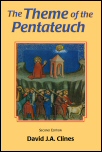
This popular textbook regards the Pentateuch as a literary whole, with a single theme that binds it together. The overarching theme is the partial fulfillment of the promises to the patriarchs. Though the method of the book is holistic, the origin and growth of the theme is also explored using the methods of traditional source analysis. An important chapter explores the theological function of the Pentateuch both in the community for which the Pentateuch was first composed and in our own time. For this second, enlarged edition, the author has written an Epilogue reassessing the theme of the Pentateuch from a more current postmodern perspective.
David Clines is Professor of Biblical Studies and Head of Department in the University of Sheffield. His is also the author of the volumes on Job in the Word Biblical Commentary.
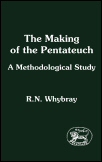
Making of the Pentateuch, first published in 1987, has become one of the most important books on Pentateuchal origins published in a generation. In this volume, Whybray surveys the field of Pentateuch origins first developed by Julius Wellhausen in the late nineteenth century and Hermann Gunkel in the early twentieth century.
Making of the Pentateuch is divided into three sections. Part one examines literary hypotheses, looking at the Documentary Hypothesis in particular. Whybray surveys Pentateuchal criticism since Wellhausen, assesses the Documentary Hypothesis, and compares the Documentary Hypothesis to other literary hypotheses. In part two, Whybray surveys the form-critical and tradition-critical hypotheses, devoting extensive discussion to the methods of Martin Noth, Georg Fohrer, R. Rendtorff, E. Blum, and others. The final part of Making of the Pentateuch proposes an alternate approach, examining the possibility of a single author and introducing new methods of studying Pentateuchal sources. This volume also contains a massive bibliography and author index.
Whybray's . . . book is a masterful review of all the options set out by critical scholarship since Wellhausen, i.e., over the last century. It is an exhaustive and up to date treatment, concise and highly readable.
—E. Dyck, Crux
R. Norman Whybray was Emeritus Professor of Hebrew and Old Testament Studies at the Univeristy of Hull before his death in 1997. He is also the author of The Good Life in the Old Testament.
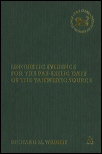
For the past few decades a growing number of scholars have attempted to overthrow the traditional Wellhausian view that the so-called "Yahwist" or "J" source of the Pentateuch is the oldest of the four major sources. These scholars have argued that "J" was composed during the exilic or post-exilic periods of ancient Israel. Their arguments have focused on the literary, historiographic, and theological characteristics of "J."
This book attempts to re-evaluate on linguistic grounds such efforts to place the Yahwist source in the exilic or post-exilic periods. The study employs the methodology developed most prominently by Avi Hurvitz for identifying characteristic features of post-exilic Hebrew ("Late Biblical Hebrew"). This divides the language of the Hebrew Bible into three main chronological stages: Archaic Biblical Hebrew (ABH), Standard Biblical Hebrew (SBH), and Late Biblical Hebrew (LBH). Wright examines forty features of "J" for which useful comparisons can be made to LBH and finds no evidence of LBH in the entire Yahwist source. Therefore it is unlikely that "J" was composed during the post-exilic period. Moreover since Hurvitz has shown that the exilic period was a time of transition between SBH and LBH such that late features began to occur in exilic texts, the author concludes on linguistic grounds that "J" was most likely composed during the pre-exilic period of ancient Israel.
Rick Wright serves as pastor of Church of the Nations and as Minister of Missions, University Baptist Church, Baton Rouge, Louisiana and is an adjunct professor of Jewish Studies, Tulane University, New Orleans, Louisiana.
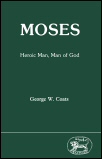
Moses is a hero. His prominence in the narratives of exodus from Egypt, the wanderings in the wilderness, and the journey to the brink of the Promised Land make Moses a central figure in Old Testament history and literature. Further evidence of the magnitude of Moses’ influence is also found outside the Christian and Jewish traditions—in extra-biblical literature, in Renaissance art, in modern Hollywood depictions of his life, and elsewhere.
Moses: Heroic Man, Man of God explores the character of the Moses traditions in the Old Testament to see more clearly why they have influenced the world as much as they have. Although Coat’s volume is primarily concerned with literary analysis, he does not ignore the insights of historical and sociological studies. The result is a landmark volume on the life and influence of one of the key figures of the Hebrew Bible.
George W. Coats was professor emeritus of Old Testament at Lexington Theological Seminary, Kentucky before his death in 2006. He wrote the commentary on Exodus 1-18 and coauthored Numbers in the Forms of the Old Testament Literature Series (17 Vols.).
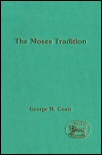
The Moses Tradition contains sixteen essays on the life of Moses. The authors employ form-critical and traditio-historical exegetical methods, paying careful attention to the text. The essays in this volume examine Exodus 3, Moses in Midan, Moses and Amalek in Exodus 17, the crossing of the sea in Israel’s early history, Moses and the golden calf, texts which describe Moses’ death, Moses’ marriage to a Cushite woman in Numbers 12, the call of Moses and Exodus 2, Moses as a model for ministry, healings, and more. The Moses Tradition is an authoritative summary of current scholarship on the life of Moses, and the implications of Moses in Israel’s history.
George W. Coats was professor emeritus of Old Testament at Lexington Theological Seminary, Kentucky before his death in 2006. He wrote the commentary on Exodus 1-18 and coauthored Numbers in the Forms of the Old Testament Literature Series (17 Vols.).
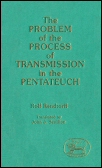
In The Problem of the Process of Transmission in the Pentateuch, Rolf Rendtorff is interested above all in the process by which the Pentateuch reached the form in which it now lies before us. He concludes that the classic Documentary Hypothesis has been tried in the fire and found wanting, and traces briefly the scholarly path that led him to this conclusion. His approach has been met with strong disagreement, cautious agreement, and, in some quarters, relief and readiness to look for other ways than that of the documentary hypothesis to explain the formation of the Pentateuch. It is certain, however, that scholars of the Pentateuch cannot ignore Rendtorff’s important volume.
Rolf Rendtorff is emeritus professor of Old Testament at the University of Heidelberg.
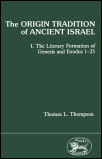
For more than three decades, Thomas L. Thompson has written at the intersection of biblical theology and archaeology. Origin Tradition of Ancient asks important questions about historicity in general and Israel’s history in particular—including, perhaps most importantly, at what point Israel’s history begins.
After surveying the recent literature on the subject, Thompson closely examines the Pentateuchal tradition as a narrative of Israel’s history, and offers detailed exegesis of the historical narratives in Genesis and Exodus, including Adam, Abraham, Isaac, Jacob, Joseph, Moses, and the sojourn in the wilderness. He closes with a discussion of chronology and historiography.
Thomas L. Thompson is a biblical scholar and theologian. Since 1993, he has been professor of theology at the University of Copenhagen.
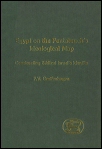
This book explores the references to Egypt in the Pentateuch—twice as dense as in the rest of the Hebrew Bible—in the context of the production of the text's final form during the Persian period. Here, as Greifenhagen shows, Egypt functions ideologically as the primary "other" over against which Israel's identity is constructed, while its role in Israel's formation appears as subsidiary and as a superseded stage in a master narrative which locates Israel's ethnic roots in Mesopotamia. But the presentation of this powerful neighbor is equivocal: a dominant anti-Egyptian stance coexists with alternative, though subordinate, pro-Egyptian views, suggesting that the Pentateuchal narrative was produced within a context of ideological conflict over attitudes towards a land that provided a home for Jewish fugitives and emigrants.
Franz V. Greifenhagen is the Assistant Professor of Religious Studies, Luther College, University of Regina, Saskatchewan, Canada.
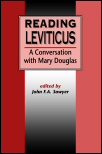
Until recently, Leviticus has been read, especially in Christian circles, as part of a 'priestly' work with a predominantly prescriptive and ritualistic agenda. In this volume of papers read at a colloquium held in honor of Mary Douglas at Lancaster University in 1995, experts in the Hebrew Bible, Jewish law, comparative law, classical literature and social anthropology raise challenging questions about the composition, context and purpose of the book. Can it be read as an autonomous literary unit? How significant are its unique ethical insights? Is it law or narrative? Does it reflect actual Second Temple Period practice? How is it related to the Mishnah?
John F. A. Sawyer was Head of Religious Studies, University of Newcastle-upon-Tyne, and is now Senior Research Fellow, University College of St Martin, Lancaster.
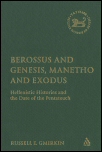
Berossus and Genesis, Manetho and Exodus proposes a provocative new theory regarding the date and circumstances of the composition of the Pentateuch. Gmirkin argues that the Hebrew Pentateuch was composed in its entirety about 273–272 BCE by Jewish scholars at Alexandria that later traditions credited with the Septuagint translation of the Pentateuch into Greek. The primary evidence is literary dependence of Gen. 1–11 on Berossus’ Babyloniaca (278 BCE) and of the Exodus story on Manetho’s Aegyptiaca (c. 285–280 BCE), and the geo-political data contained in the Table of Nations. A number of indications point to a provenance of Alexandria, Egypt for at least some portions of the Pentateuch. That the Pentateuch, drawing on literary sources found at the Great Library of Alexandria, was composed at almost the same date as the Septuagint translation, provides compelling evidence for some level of communication and collaboration between the authors of the Pentateuch and the Septuagint scholars at Alexandria’s Museum. The late date of the Pentateuch, as demonstrated by literary dependence on Berossus and Manetho, has two important consequences: the definitive overthrow of the chronological framework of the Documentary Hypothesis, and a late, third century BCE date for major portions of the Hebrew Bible which show literary dependence on the Pentateuch.
[Berossus and Genesis, Manetho and Exodus] has a bold thesis and detailed argumentation . . . this volume is an intriguing read because it challenges us at every turn to think about source-critical questions and to ask about the direction of literary dependence.
——Journal of Hebrew Scriptures
This is a detailed study and a good example of thinking outside the box.
—Theological Book Review
Russell Gmirkin is a writer, researcher, and Dead Sea Scrolls scholar living in Portland, Oregon.
Reviews
2 ratings

Faithlife User
1/13/2015
Tom Serrano
12/21/2013